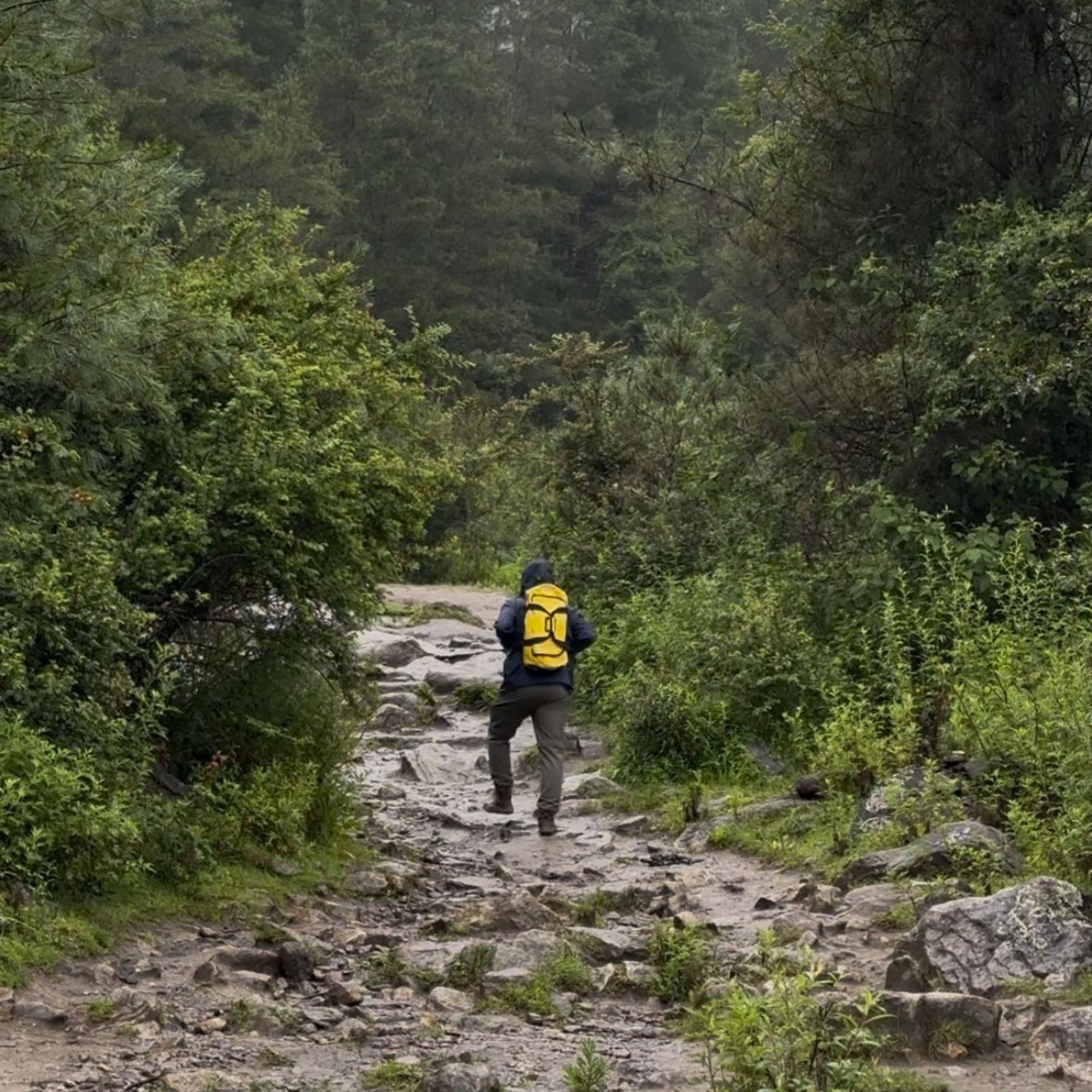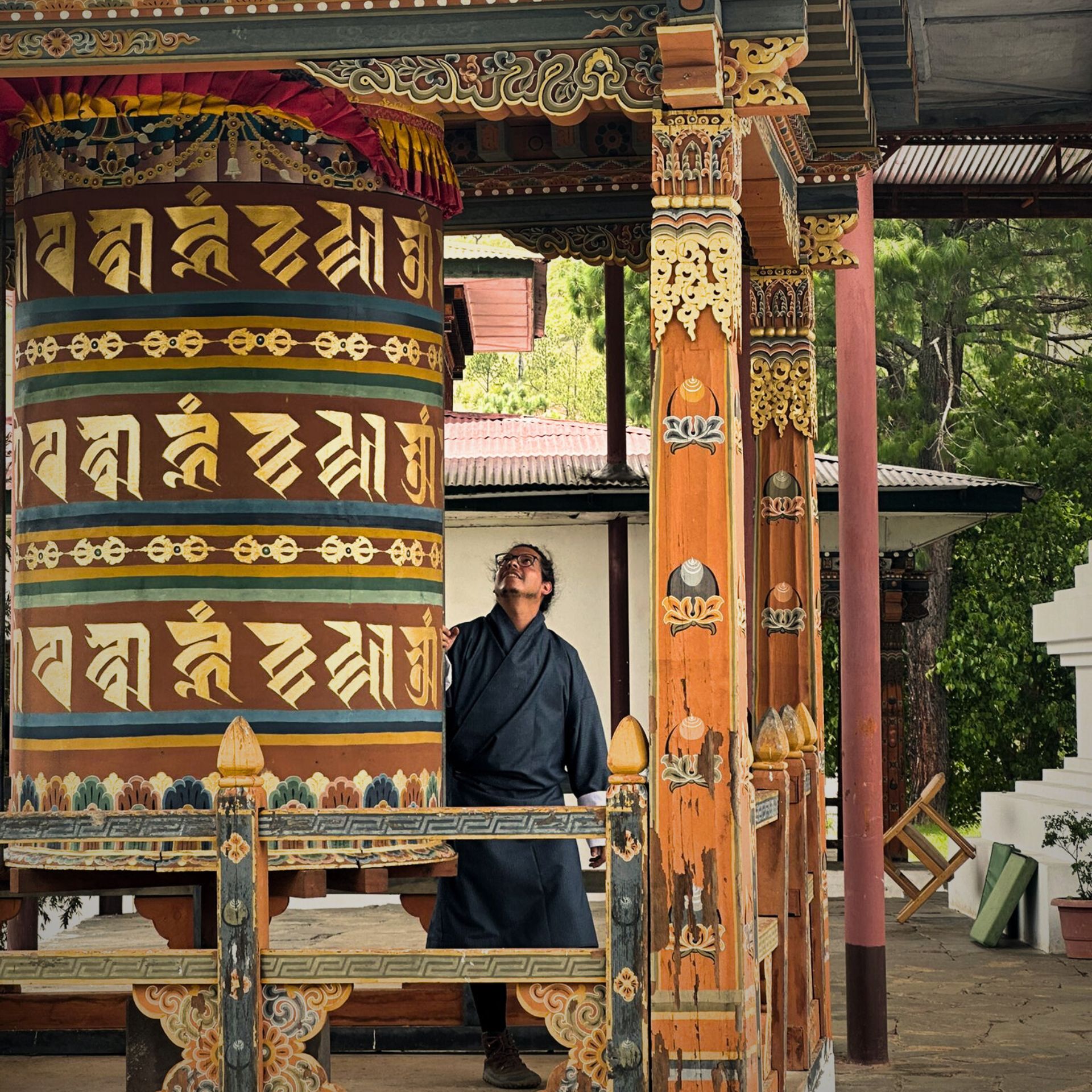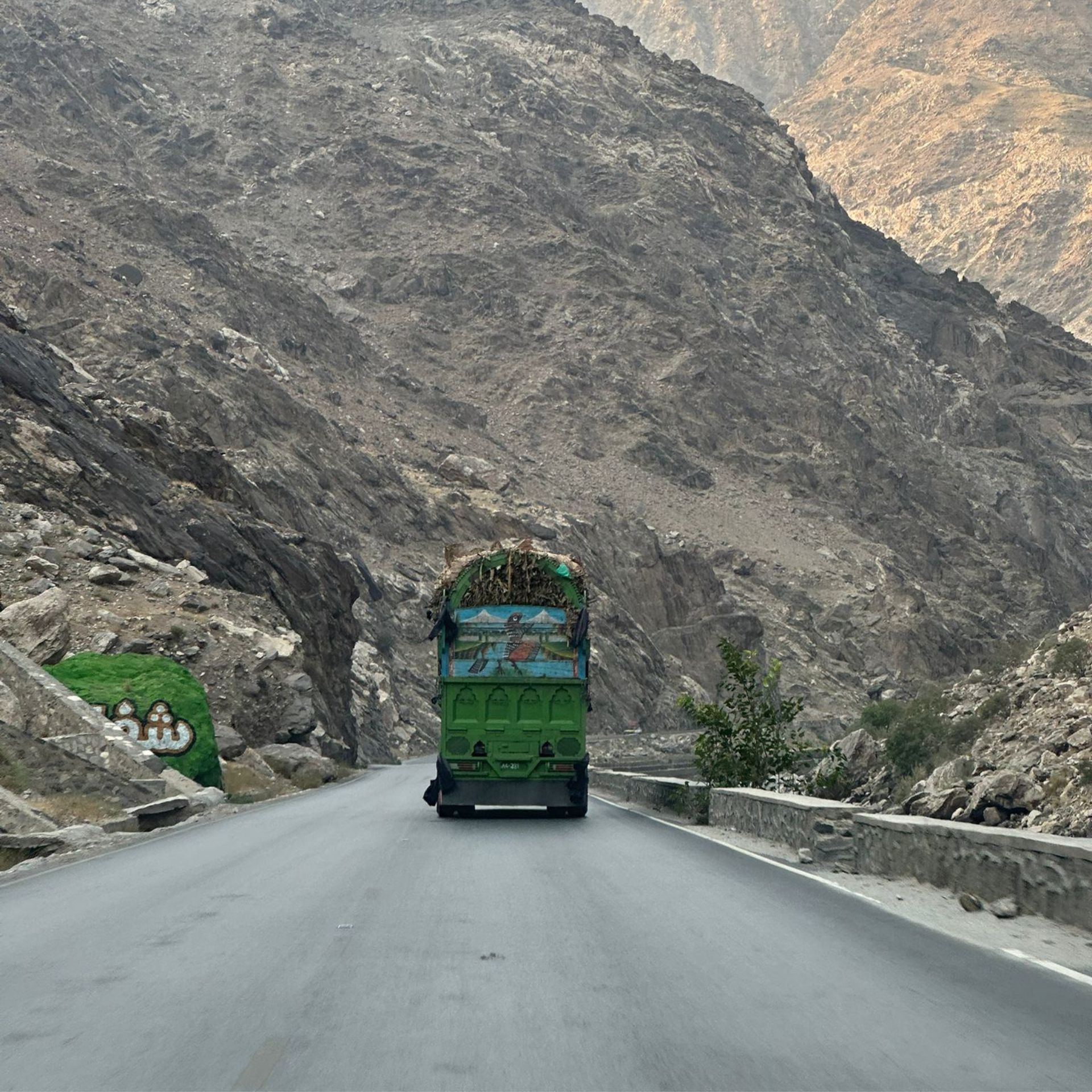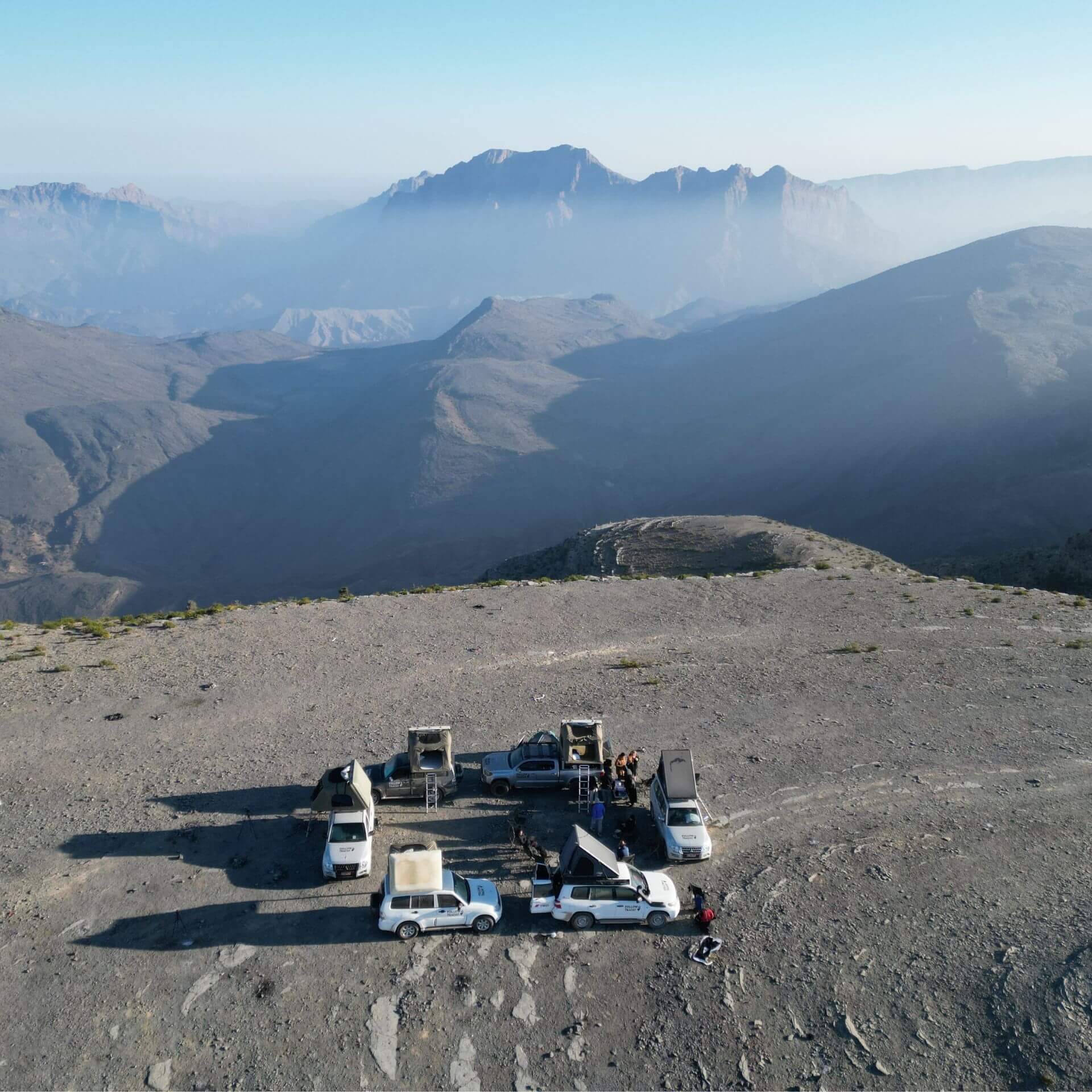Singapore is known for having some of the weirdest and most bizzare laws in the world. These are 10 crazy and real laws in Singapore
[Updated in 2024]
I had the chance to live and go to university in Singapore. It was a place that fascinated me from the first time I arrived. Singapore is clean, organized and simply can be considered the city of the future. But keeping such an utopia alive requires some restrictions. And yes, while most of them are necessary to keep everything on track, others seems to be taken out of nothing and for no reason.
I wrote this article back in 2014 and 10 years later I reviewed it and tell you again which are the weirdest and craziest laws in Singapore. Still, sometimes it can be a little bit too much. I decided to check out which laws still take place in this country and write 10 crazy laws in Singapore.
Don’t worry, I will also tell you a few odd things that are allowed in Singapore, but not in many other countries in the world.
Quick links for vacation in Singapore
Need to book a hotel?
Agoda may help you to book accommodation in advance and check availability on the days of your travels!
Need to always be in touch?
Airalo will provide you with a connection so that you can share your experiences with your loved ones at any time!
Need to visit the best activities?
Klook will offer the most relevant and exciting tours, taking into account your wishes and budget!
Walking naked in your own home
Fine: 2.000 SGD (1.400 EUR)

Under the Miscellaneous Offences Act, it is illegal to walk naked in your own home. Well, technically. According to this law, any display of public nudity in Singapore is considered a punishable offense. And yes, I know. Being in your own home does not mean that you are in public.
However, it seems that a few people have been caught by their neighbors walking around their own homes naked, and instead of minding their own business, they reported it to the authorities.
This is probably a law that sounds so ridiculous that most people would probably ignore it. Still, for those who live a naturist lifestyle, it’s better to keep that in mind when you are in Europe – a place that is certainly more liberal when it comes to this.
Carrying durians on the metro system
Fine: 500 SGD (350 EUR)
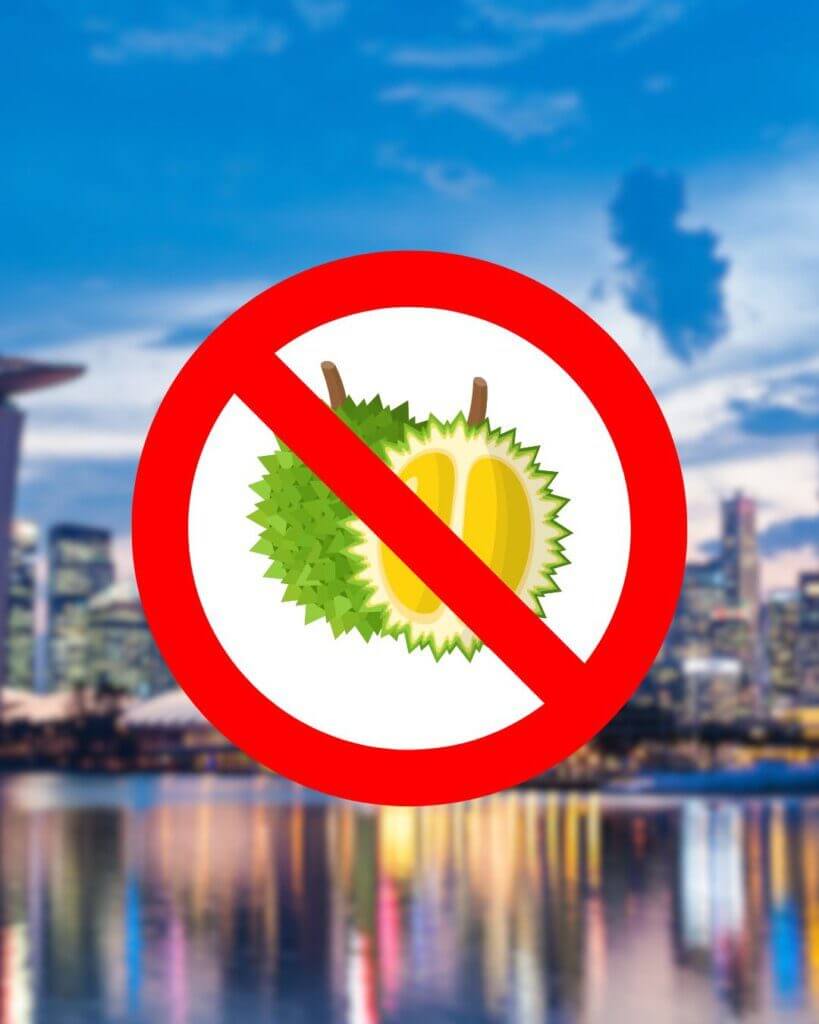
The “no durian” sign has become a symbol of Singapore and its peculiar rules. Carrying this pungent fruit on the metro, bus, or taxi is forbidden. The reason behind this rule is likely the disturbance it can cause to fellow passengers. After all, who enjoys being on public transportation with someone eating smelly food?
But don’t worry, you can still enjoy durian in public places. In fact, in Chinatown, it’s popular for tourists to give it a try – and it’s not as bad as you might think. Personally, I enjoy durian ice cream and durian mochi dessert, two delicacies you can even find in Europe and America.
Smoke in public places
Fine: From 150 SGD and up to 1.000 SGD (700 EUR)
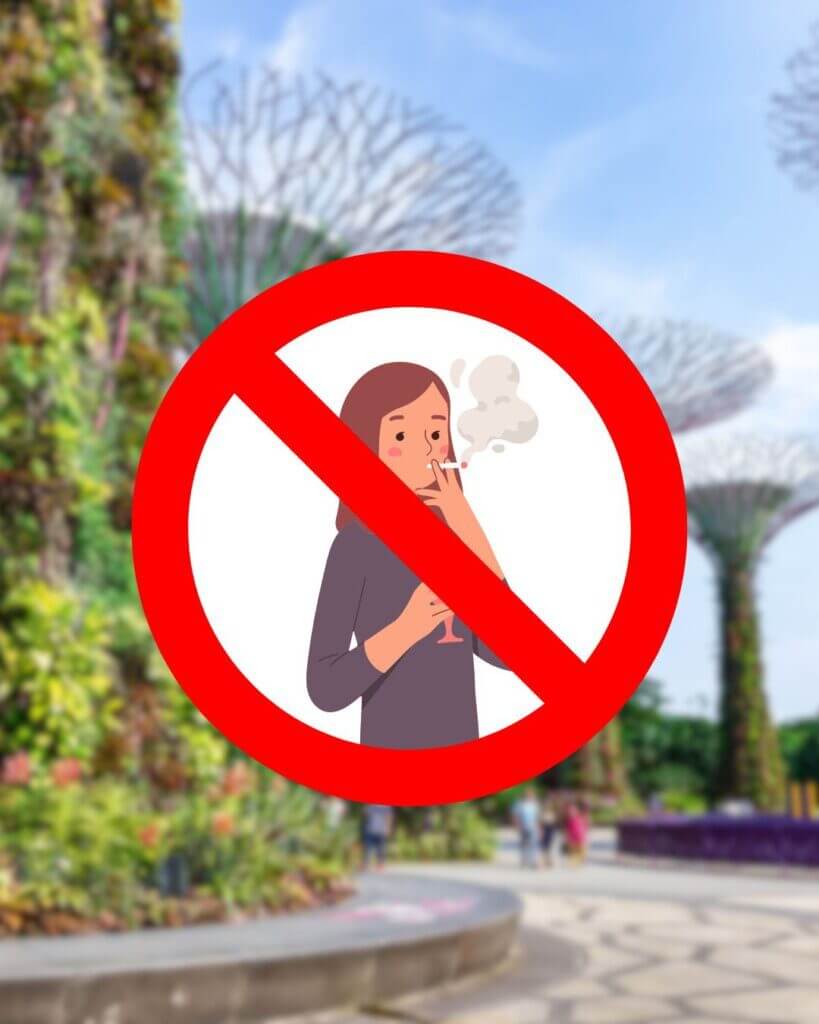
Singapore has become very restrictive when it comes to smoking areas, a regulation that I certainly do not mind as a non-smoker. With most of the country being urban and the green areas designated as national parks and reserves, smokers need to ensure they are in designated smoking areas when lighting up.
To give you an idea, smoking is strictly forbidden in various locations, including: bus and taxi stands, outside buildings (you must be at least five meters away), parks, beaches, covered walkways, restaurants, shopping malls, and all public government buildings.
Additionally, there are certain areas designated as “non-smoking zones” where smoking is prohibited, with no designated smoking areas nearby.
Sale of gum
Fine: 1.000 SGD (700 EUR)
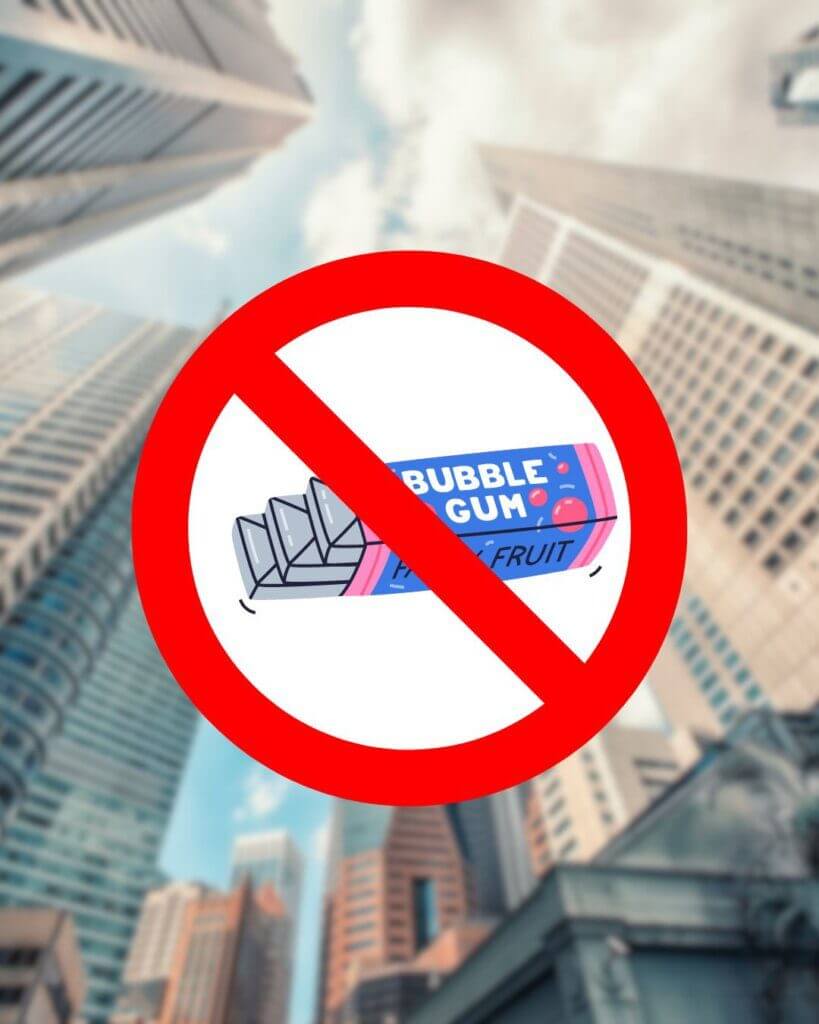
Singapore prohibited the sale of gum after authorities noticed a prolific amount of chewed gum stuck in subway stations and on cars.
Moreover, bringing a certain amount of chewing gum into Singapore can also be punishable. If you decide to bring a large quantity of chewing gum into the country, you might have to declare it. Upon arrival in Singapore, you may even encounter the question on customs forms: “Are you carrying any arms, drugs, alcohol, tobacco, or gum?”
This is undeniably one of the craziest laws in Singapore and has even made its way into popular culture. Travelers can purchase magnets and t-shirts indicating the potential fines for chewing gum in public.
Failure to flush a public toilet after use
Fine: 600 SGD (400 EUR)
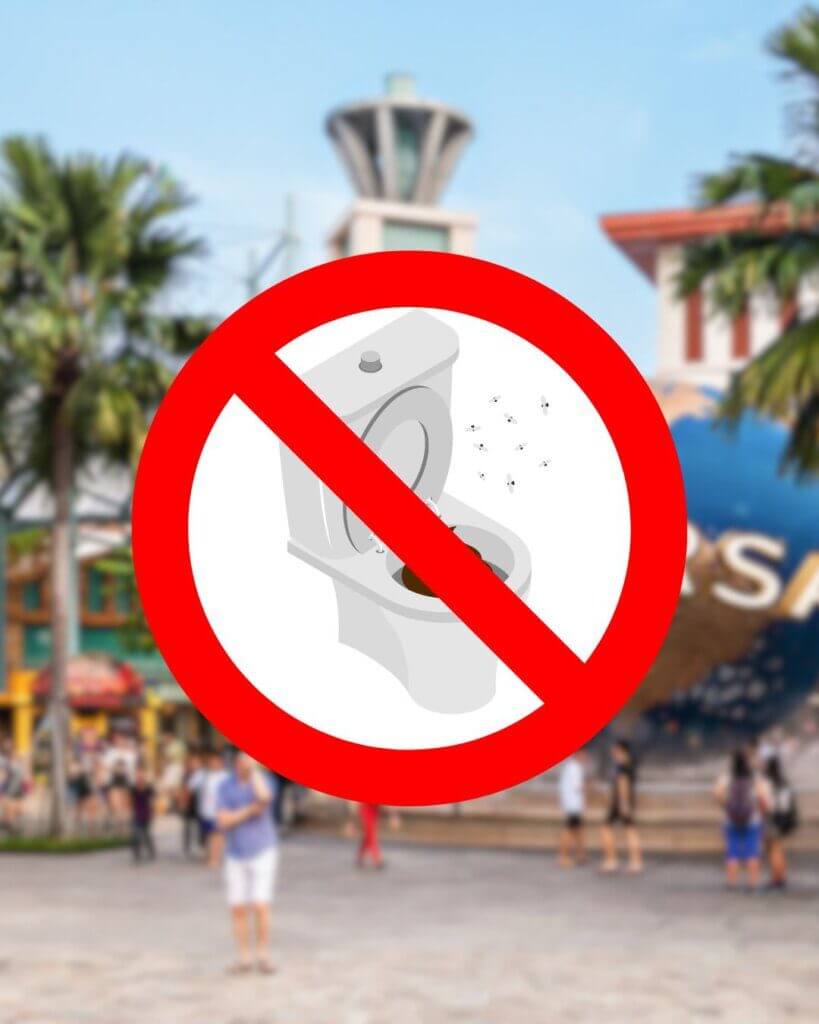
Nobody likes to enter a toilet and discover that the previous person didn’t flush. Most of us would simply change to another stall and leave it for the cleaning staff to handle.
To address this issue and ensure clean toilets, the government has implemented fines for those who forget to flush after use – a thoughtful initiative, isn’t it?
Reportedly, police officers conduct random checks to ensure that public toilets are flushed after use. The fine for failing to flush a toilet in Singapore can amount to up to 600 SGD.
Feed pigeons in public
Fine: Up to 10.000 SDG (7.000 EUR)
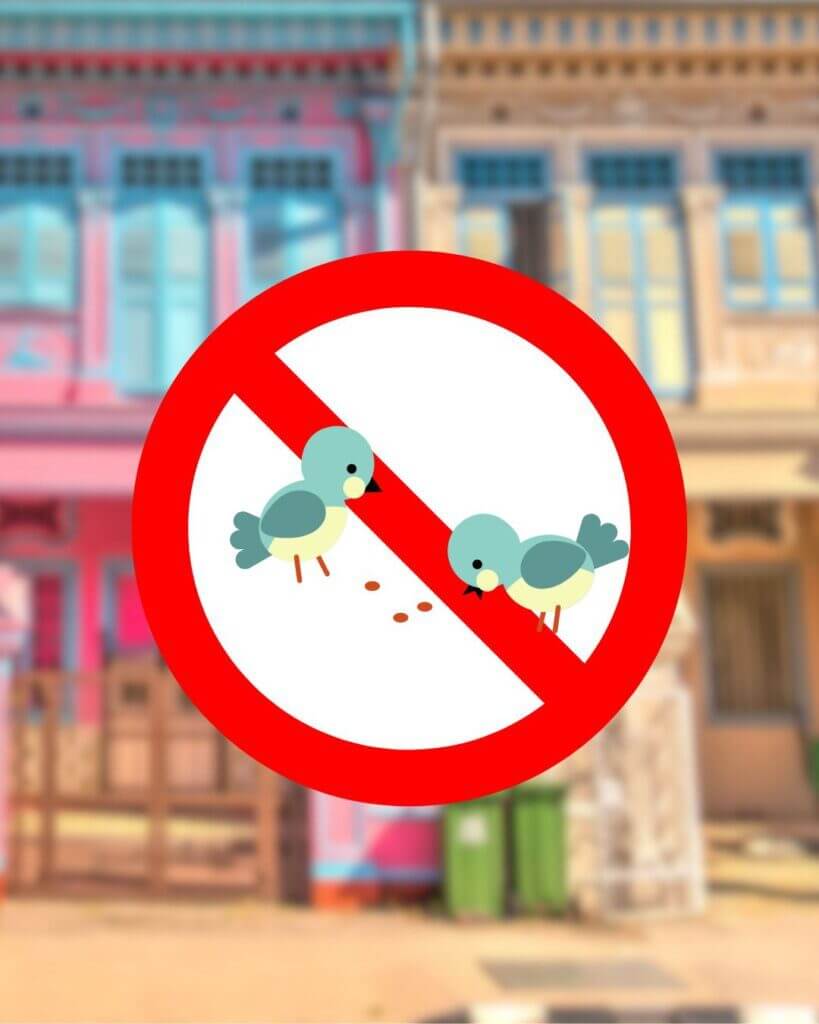
Under the Wildlife Act, feeding pigeons in Singapore is illegal, and offenders can face hefty fines. The rationale behind this law is to prevent the spread of diseases that can result from feeding wild and stray animals. This regulation aligns with common practices observed in zoos worldwide, where feeding animals is strictly prohibited, as well as in most national parks. It appears that in Singapore, this law applies throughout the entire city.
Annoying someone with loud music
Fine: Up to 3 months in prison and/or 1.000 SGD (700 EUR)
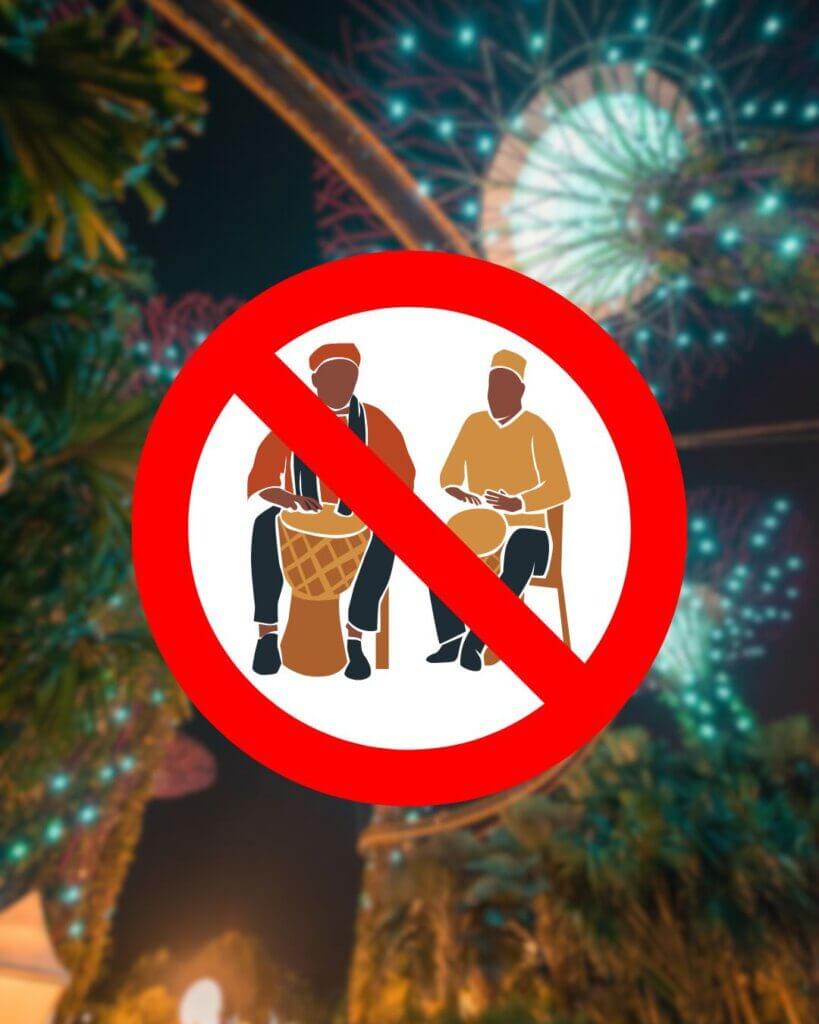
While it’s an unspoken rule in most cultures (except in South America and the Caribbean), in Singapore, it is illegal to annoy someone by playing an instrument too loudly or playing music at a high volume.
This is one of those laws where it’s uncertain whether the guilty party would actually be prosecuted. However, considering that Malaysia once prosecuted two girls for standing naked in front of a mountain, anything seems possible in Southeast Asia.
A more realistic scenario is that the annoyed person will approach you privately and simply ask you to lower the volume of the music.
Connecting on unsecured Wi-Fi (password guessing)
Fine: Up to 3 years in prison and/or up to 10.000 SGD (7.000 EUR)
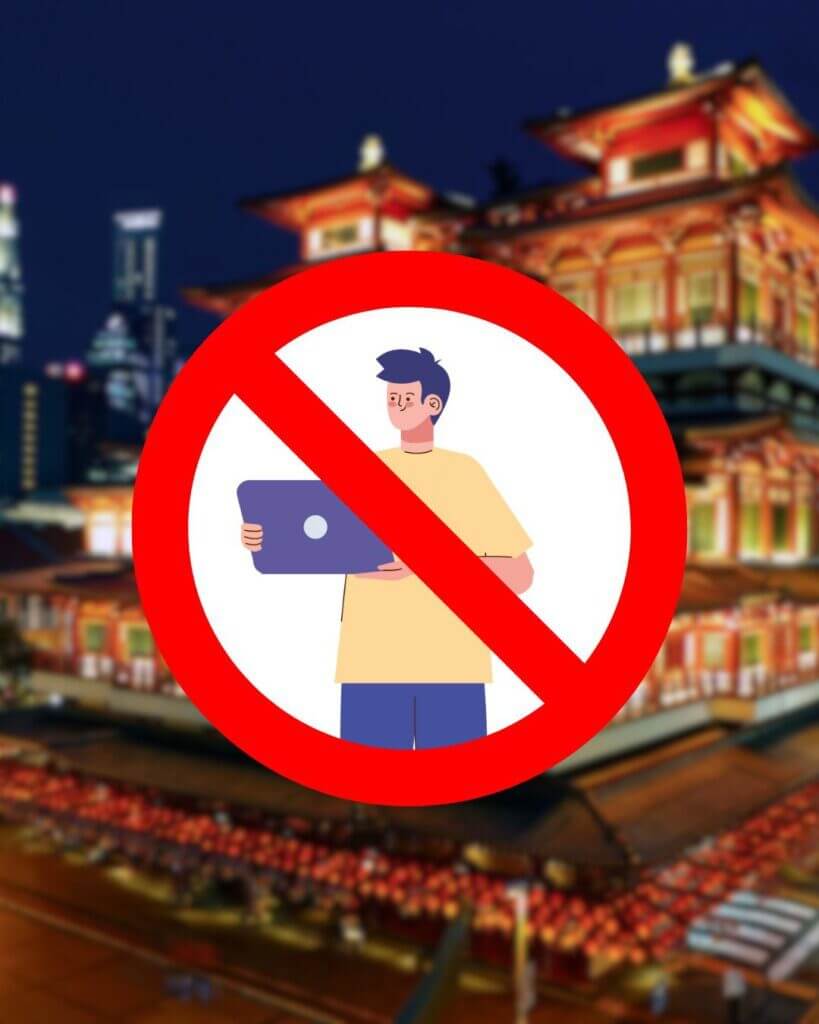
Singapore is known for being at the forefront of technology. However, some rules regarding internet usage remain unclear. In 2006, a 17-year-old teenager was charged for accessing his neighbor’s wireless internet connection, facing charges under the Computer Misuse Act. The argument was that connecting to an unsecured Wi-Fi connection without permission is considered a form of hacking. Would this rule still hold today? It’s uncertain.
I would estimate that 99.9% of Singaporeans have a password on their Wi-Fi routers, and those who don’t are typically public places offering free internet.
Don’t worry; if you connect to any of the thousands of free hotspots around the city, you are safe. This law only applies if you use your neighbor’s internet without their knowledge or if you guess passwords to access free internet.
Vaping or smoking shisha
Fine: 2.000 SGD (1.400 EUR)
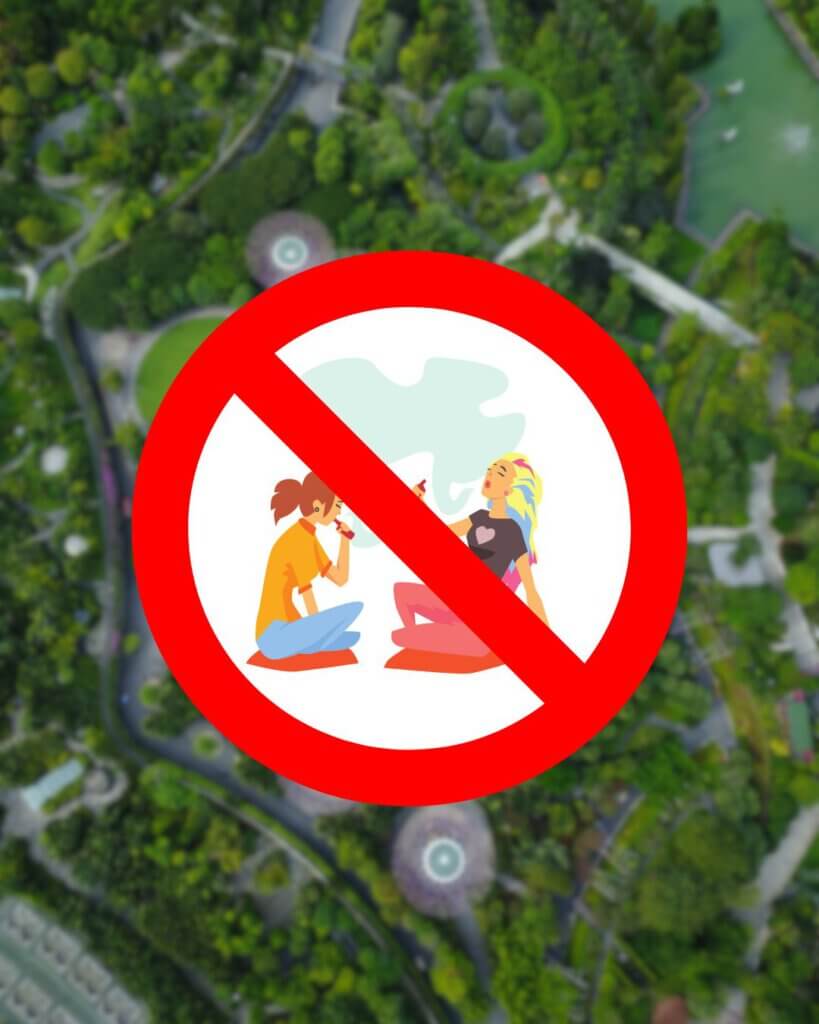
Since 2018, vaping has been banned in Singapore for no specific reason. Under the Tobacco Act (TCASA), it is illegal to possess, purchase, and use vaporizers in Singapore. Offenders can be fined up to 2,000 SGD.
Although there are no restrictions on bringing a vape into the country (you may just be asked a few questions at the airport), make sure not to use it in public or arouse suspicion at your hotel, Airbnb, or home.
Additionally, shishas have been banned in Singapore since 2014, and this is unlikely to change anytime soon.
Consume drugs outside Singapore
Fine: 20.000 SGD (14.000 EUR)
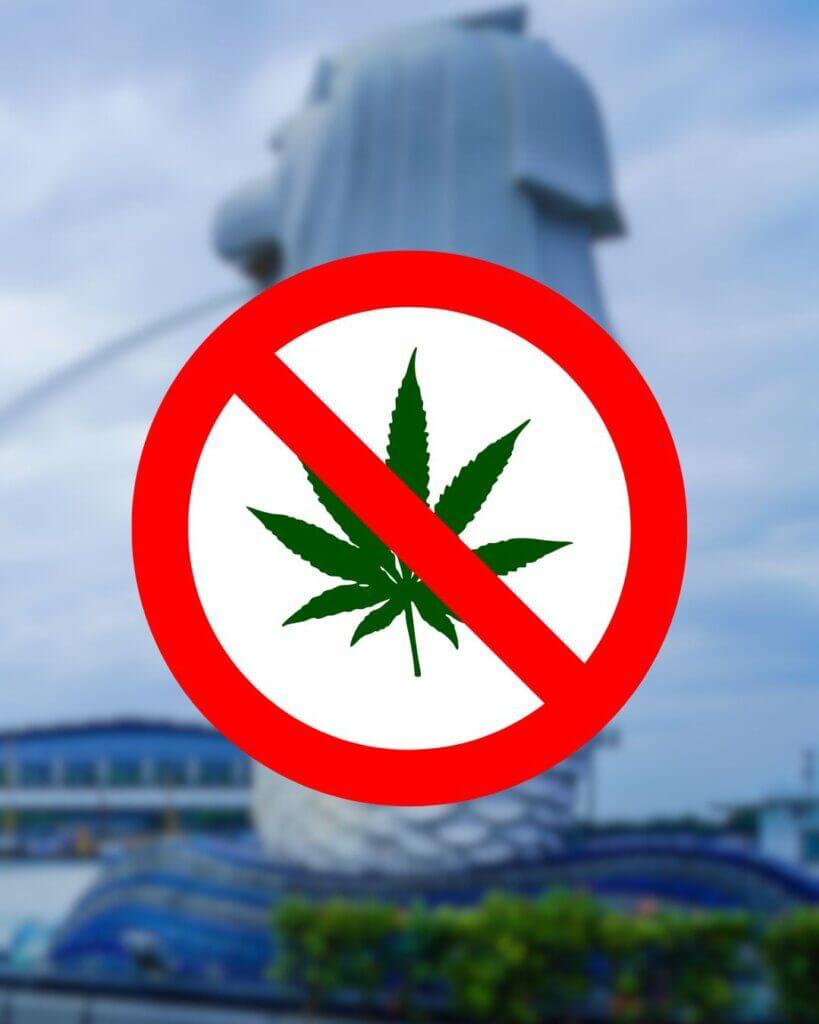
Singapore has some of the strictest drug laws in the world, with severe penalties for drug-related offenses, including possession, trafficking, and consumption. Even small amounts of illegal drugs can result in lengthy prison sentences or even the death penalty.
But did you know that you can be charged with a crime if you fail to pass a drug test while in Singapore? Yes, under the Misuse of Drugs Act, it is an offense for any Singaporean national or permanent resident to consume drugs overseas. If caught, Singaporeans may face imprisonment for a minimum of 1 year and/or a fine of up to 20,000 SGD (14,000 EUR).
What happened again in that trip to Amsterdam!
Other unusual laws applicable in Singapore, which may also apply elsewhere or simply reflect common sense:
- Distribution of pornographic materials
- Spitting
- Flying a kite that interferes with public traffic (but I guess also anything else that interferes with public traffic)
- Urinating in a public elevator
- Jaywalking
- Painting graffiti in public
- Committing suicide (On 2019, the law was officially amended to decriminalise suicide)
Read more: 48 Tips for backpacking South East Asia
What is allowed in Singapore, but not in other countries around the world
- Drinking in public
- Flying drones in urban areas (under some restrictions
With such a variety of unusual rules and regulations in place in Singapore, which of these laws would you like to see implemented in your own country, and which ones do you consider utterly pointless?

